Blackwater Holylight’s new Veils of Winter sounds like the product of collective decision-making, because it is. While the album could easily be lumped into a heavy-music category, there’s actually a lot of detail going on that co-founders Allison “Sunny” Faris, who plays bass and fronts the group, and guitarist Laura Hopkins credit to the diversity of musical interests in the quintet. The tones are heavy and often detuned, but the layers of atmospheric guitar, reverb-soaked vocal harmonies, and vintage-sounding synths supply colors that can’t be pigeonholed, bringing to mind a range of references from retro horror-movie soundtracks to 1970s proto-punk. “Spiders,” for example, features an homage to the iconic intro from Television’s “Friction,” but there are also nods to prog rock, post-rock, psychedelia, and doom metal.
“There’s no way I can say I wrote that record, because I didn’t,” says Faris. “All five of us did, and that’s really special and really important to me.” While Faris came up with the idea to form the band and instigates much of the songwriting, she is also very appreciative of the creative balance within the group. “I just really love and honor bands that are up there doing their thing and letting everyone be themselves and sharing songwriting credits,” she adds.
Longtime friends Faris and Hopkins intended Blackwater Holylight, which they formed in 2016 following their time together in Wildwood, as a way to explore some of Faris’ heavier influences. “Me and Sunny had been playing together for a long time, and I had been tour managing for her old band [the Grandparents] and just waiting for her to be free enough to play with me,” says Hopkins, who also played bass in Tamed West and now has a solo project called Laura Palmer’s Death Parade. “Her and I had always sung harmonies together, acoustic style, and she wanted to do something a little louder. I was just getting into pedals and electric guitar volume at the time.”
Their reputation as members of respected bands in their hometown of Portland, Oregon, helped Blackwater Holylight get off to an auspicious start, selling out their first show and getting signed to RidingEasy Records six months later. “It took a little while to get it all together for the first record, but once that came out, it’s been rolling forward and it’s been really great. We’ve been learning a ton every day,” says Faris.
Contributions from new guitarist Mikayla Mayhew are felt throughout the album, opening up the sound captured on their 2018 debut, Blackwater Holylight, with elements like the guitarmonies in “The Protector” and the weaving two-guitar interplay in “Motorcycle.” “It’s cool to have another guitar player,” says Hopkins. “It gives more space and I’m stoked about that—especially playing the old stuff.” The lineup is completed by keyboardist Sarah McKenna and drummer Eliese Dorsay.
We caught up with Faris and Hopkins on the phone to discuss Blackwater Holylight’s story, from the inspirations behind the band to Veils of Winter and their favorite gear—including whether rusty strings and dirty home-modified amps contribute to the group’s sound.
Where did the sound of Blackwater Holylight emerge from?
Sunny Faris: I’ve always had a spot in my heart for heavier music. This band was about filling a curiosity I had about wanting to experiment with tones and writing styles that I didn’t really get to use in my old band. As soon as I started doing all this, it really opened up the gateways to a lot more metal that I listen to and just a lot more music in general. All the stuff that I’m into now, I wasn’t listening to when the band started. I had a little bit of heavier stuff in my library, but really it was a lot of psych. My love for metal and heavier tones has kind of formed as the band has formed, side by side.
In my old band, I wasn’t the songwriter, so it was a little strange. Now I can kind of do whatever I want and visit these areas that I’m curious about. I left it really open for myself and all this happened. I was vulnerable because I didn’t know what I was really doing all the way, but it was also fun.
Laura Hopkins: Sunny has been into heavier music and she’s been teaching me a lot about heavy music, doom, and metal. I have been more into moody singer-songwriter music that is emotionally heavy, and psych rock. Our different tastes really speak to the music we make, because we all listen to such different things.
What bands would you consider reference points and influences?
Faris: Some of my favorite metal bands are Sumac, Thou, Inter Arma, Mizmor, and Fórn. I have a million favorites, so the list could go forever.
Hopkins: My favorite bands are Blonde Redhead, Big Thief, and Electrelane, which is pretty far from some of the music that Sunny listens to, but there’s a similarity in feeling and emotion to be portrayed. I think that’s where Blackwater got its sound from. It’s rooted in the fact that we hadn’t played heavy music before, but we wanted to. When we all got together, we were like, “This is a safe space for us all to experiment and not have someone tell us that’s not how you’re supposed to do it.”
It’s crazy when we get in the van. Our tastes are so different, we get annoyed when another person puts on another kind of music … because Sarah is going to go into Goblin or some synthy ’90s hole, or I’m going to put on something emotional where everyone is crying, Sunny has someone screaming. We’re all really annoying in the van! We’re all very different.
How does the songwriting process work in the band?
Faris: When I write songs, it’s usually because I’m trying to digest something that happened to me. You can hear that on the record. A lot of the songs are about people that we’ve lost and scary situations we’ve been in. I’m influenced mainly just by the climate of life. The way the songwriting goes with us is, I come to the table and I usually have a bass line or guitar part and some sort of vocal idea. I come up with the ideas for stuff, but then once it’s all out on the table, we’re talking about it and working on structure, and we’re rearranging some stuff and it’s totally a collaboration.
For the song “Motorcycle,” I had part of the riff down and I played it for the band. We jammed on it and Laura went home and added on the second part of the riff and brought that to me and said, “let’s do some vocal melodies,” so then I came up with the vocal melody on top. That song was a combination of us writing.
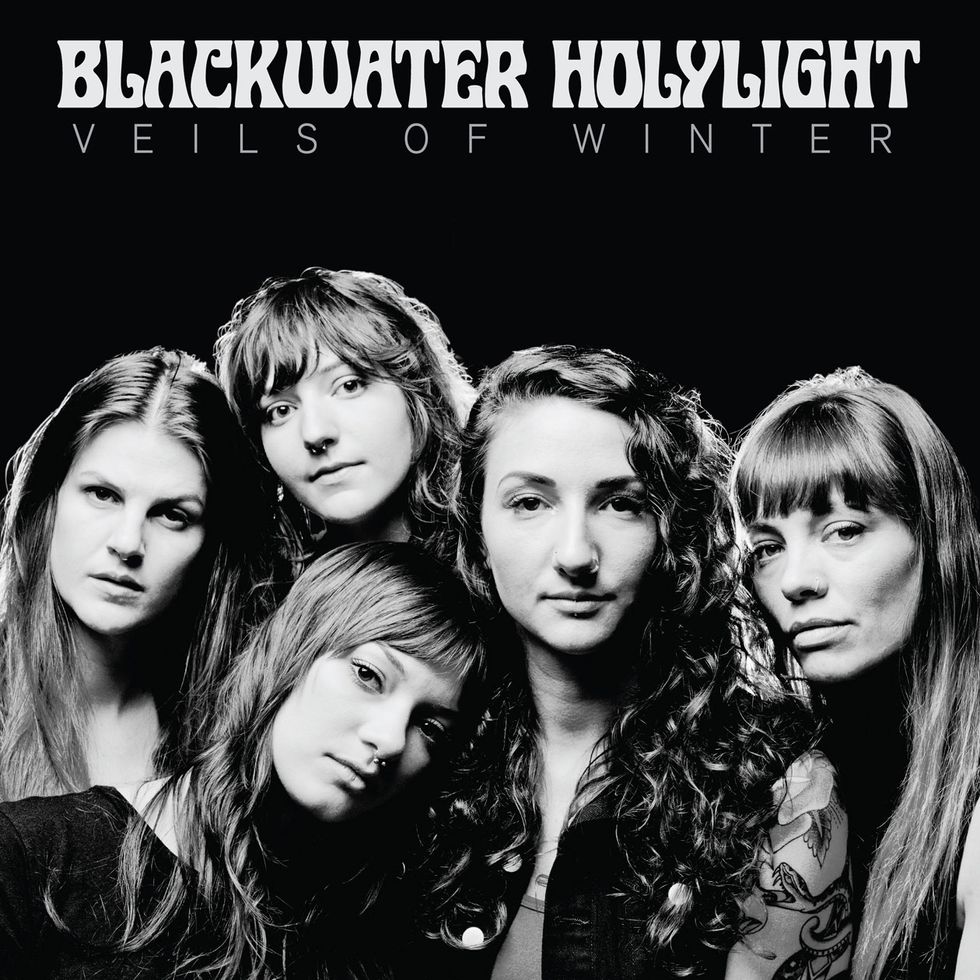
TIDBIT: The band fleshed out its songs for Veils of Winter in a marathon three weeks in Northeast Portland, Oregon’s Red Lantern studio with engineer Dylan White, who also played with Faris in the Grandparents.
Throughout the entire record in general, everyone wrote their own parts. Mikayla and I switch a little bit on the new album, so she plays bass and guitar and I played bass and guitar throughout it. There’s no doubt there’s a lot of different sounds on the record, and that’s just because we’re all into a lot of shit, so we’re not pigeonholing ourselves into making a super-metal record. That’s just where we landed. We still get to do whatever the fuck we want and we’re going to do whatever the fuck we want.
Sunny, let’s talk about your experience as a bass player. What gear are you using? You tune down, right?
Faris: We do a couple different tunings. We play in standard and we play in drop D and drop C for some stuff. Right now, I play a 1976 Fender Musicmaster, and that’s been my bass for a long time. When I first started playing, I was playing a Danelectro, but I bought this a handful of years ago and I love this bass.
My amp is a Sovtek MIG-100 that I play out of a Sovtek 4x10 cab. When we’re doing a soundcheck, I always get to hear that it’s a guitar amp, and I’m like, “I’m aware,” but it sounds really good so I’m gonna do my thing. I also have a Sunn 215B that I play out of sometimes when I feel like hauling it around, which is not always.
The guitar that I played on the record is a friend’s Gibson SG. I just fell in love with that guitar. I love fingerpicking and it’s just perfect for that.
I use a couple different pedals. I have a Death by Audio Fuzz War, which is a huge and amazing pedal, and I also have a Magic Pedals Wizard Fuzz. Those pedals are really cool. It’s this guy who builds amps for Dunwich, and on the side he makes these pedals. I also have an Electro-Harmonix Small Stone phaser and I just recently got a Tech 21 reverb pedal, and it’s just so cool that I wish that I had it when we made the record.
Laura Hopkins plays a reissue ’72 Fender Tele through a modest array of pedals. “I’m so impressed with the Telecaster because it holds its tuning so well,” she says. “I’ve changed the strings on my Telecaster maybe once and I’ve had it for five years. There’s filth on it. This just goes with the sound of the sludgy Pacific Northwest rainfall music we’re feeling.” Photo by Aurelia Kolodziej
How did you end up using the MIG-100 as a bass amp?
Faris: I just love Sovteks. My friend in Weed, who we went on our first tour with, plays a Sovtek out of a Sunn 2x15, and I shared his stuff on the tour and fell in love with the tones that he was getting. I used to play out of a Sunn 300T, but I was over it after I got back from that tour. I just loved the Sovtek and it sounds really good with bass. It gets so deep and growly—especially with all my fuzz pedals.
Laura, what about your amps?
Hopkins: Sunny has this giant Sovtek with a huge cab and Mikayla has a giant Music Man with a huge cab and I have this little Fender [Hot Rod] Deluxe. It’s small enough that it’s not breaking my back to carry into a venue. It’s loud as heck and it crunches up really nicely, just how I like it. I’ve changed my tubes only once and that’s because they were really busted.
I like that I have this smaller amp because it stands out in a room full of metal folks. No one else is using it when we’re playing shows with other metal bands. I set up next to these guys with giant stacks and I feel like my amp is louder on, like, three. I got it off of Craigslist from this older guy who had a bunch of weird stuff in his house, and he had done his own mods on the amp. It was my first amp I ever bought, and it was such a weird experience. He had all this taxidermy on the walls and I think he modded it to be louder than other ones because when I got the tubes replaced, there was so much random glue inside of this thing. I was like, “Can you keep that old-man taxidermy crust in there?”
That’s the best thing about gear: It’s about the experiences of how you got it and who does what crazy things to make it sound like you like. The reason I like all of my stuff is because it’s weird and different and has a story and makes the sound it does.
What’s the deal with your Tele?
Hopkins: My roommate plays a Tele. She’s a really cool graphic design artist and she’ll just doodle in her room all day and make weird sounds on the Telecaster she bought. I was obsessed with her guitar. I would play it at shows and then I just realized that I couldn’t steal her guitar, so I went to Trade Up Music, in Portland, and I found one just like it.
You’ve mentioned you were just getting into pedals at the start of Blackwater Holylight. What got you into pedals?
Hopkins: I had stolen a pedal from my brother, a [TC Electronic] Hall of Fame reverb pedal, which has this modulation reverb. I was just like, “Oh my god, this is a whole new instrument,” and I didn’t play guitar without it on until this year. I always had it on with everything I did because it just bathed the note with this atmospheric sound. That was my beginning of playing with pedals and reverb and modulation.
I’m still experimenting with pedals. The pedals that I’ve played with in Blackwater, most of them were gifted to me or stolen from my brother. I really like the Memory Toy delay pedal. I use that like a pitch bender with the delay going faster and slower. Because I play a Telecaster and it doesn’t have a tremolo bar, I use the Memory Toy kind of as a whammy bar. I have an Ibanez Tube Screamer and an Electro-Harmonix Little Big Muff for fuzz. I got that for the second record.
Do you tune your guitar extra low?
Hopkins: It’s drop D, and sometimes we do DADGAD, and on “Seeping Secrets” we do drop C. I got into drop D from a System of a Down tab book, from “Aerials.” DADGAD I got because we went on tour with a band, Weed, and they showed us about open tunings. I had never tried DADGAD before that.

Guitars
Reissue ’72 Fender Telecaster
Amps
Fender Hot Rod Deluxe
Effects
Electro-Harmonix Memory Toy
Electro-Harmonix Little Big Muff
Ibanez Tube Screamer
TC Electronic Hall of Fame
Strings and Picks
Old rusty strings
Yellow Tortex-style picks

Basses & Guitars
1976 Fender Musicmaster bass
Gibson SG
Amps
Sovtek MIG-100
Sovtek 4x10 cabinet
Sunn 215B cabinet
Effects
Death by Audio Fuzz War
Electro-Harmonix Small Stone
Magic Pedals Wizard Fuzz
Tech 21 Boost RVB
Strings and Picks
Content
Do you use heavier strings?
Hopkins: No. I’m so impressed with the Telecaster because it holds its tuning so well. I’ve changed the strings on my Telecaster maybe once and I’ve had it for five years.Maybe I should change them, but they work and it sounds fine. I changed one because it broke and I was like, “This is so bright, I hate it. How do I get it nasty and gross again?” There’s filth on it. This just goes with the sound of the sludgy Pacific Northwest rainfall music we’re feeling. Literally, it’s rusting.
It’s hard to tell from videos, but do you use your fingers or a different kind of pick?
Hopkins: I use the yellow picks. I don’t play with the pokey part. I play with the side of it. I’d always done fingerpicking up until I started playing bass in a friend’s band and I didn’t know how to use a pick. I was trying to bullshit it so I could play in the band and I was like, “Yeah, I can play bass.” But I got this pick and I didn’t know how to hold it. I put the pokey part in my fingers and used the soft, round edge. I really like how it’s not sharp in picking and the way it hits the strings. It’s more like a bow—softer and not so harsh. It’s kind of like fingerpicking, to me. I would have just done fingerpicking, until I picked up the pick wrong.
Describe the recording process for Veils of Winter.
Faris: We had three weeks in March. We went in pretty open-ended and we ended up doing a lot of writing in the studio together. We had the ideas set in place for all the songs, but there were structural things that we were figuring out and we were still writing our parts—especially all the synth stuff, which was written in the studio for the most part. There were a few songs we had pretty well done. We had already been playing “Spiders.”
My friend Dylan White was our engineer and he did the most incredible job. He was so patient with us and encouraging. It was one of the most pleasant recording experiences that I've had, which is cool because he was in my old band [the Grandparents]. The studio is called Red Lantern, in Northeast Portland, and we all did a really great job working together and writing together and giving each other suggestions. I was really happy with how seamless the whole thing was.
How is the process of making this album different from making your first album? Is it different having a second guitarist?
Faris: This album was vastly different. For the first record, we kind of made half of it one summer and half the next summer. We were in three different basement studios, we had a different drummer at the time, Mikayla wasn’t in the picture yet, and we were just kind of discovering what kind of project this was going to be, and, for me, what kind of songs I write.
Now, with the second record, we have Mikayla, and I’ve always wanted to have two guitarists, and we have Eliese [Dorsay], who is just an insanely talented drummer and so can really pull her own weight and write really interesting and dynamic parts, so it’s a totally different vibe. Making the record was just so fun.
You’ve got to lock yourself in there for the amount of time you have. There’s a little bit of pressure, which I think was helpful, actually, to have a deadline. You can do that shit forever if there is no deadline. It’d be so easy to go in and try to make an album and literally never finish it if you didn’t have to.
Hopkins: I was listening back to the first record and I was like, “We could be doing so much more.” Mikayla, she’s been playing in bands her whole life and she’s a super rock ’n’ roll chick. She knows how to use fuzz, she knows how to make it loud. I had to go through so much to get to that point and she’s just so solid. I have to be more bold with my tone sometimes because she has such a solid tone. On the new record, it’s cool to be able to do guitarmonies—doing what we do vocally but having two guitars play with the sound. I’m obsessed with harmony, so anytime we can do more harmonies, I’m stoked.
The current lineup of Blackwater Holylight gets down to the business of making dark psychedelic metal and more in a full-set performance at the now-shuttered Truckstop Alaska art space in Gothenburg, Sweden.


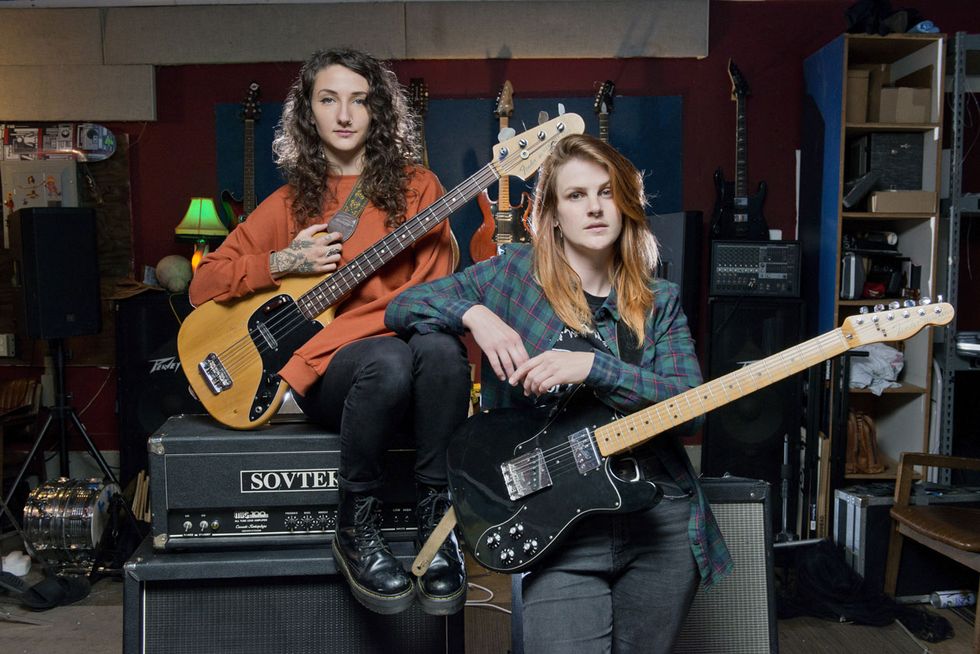

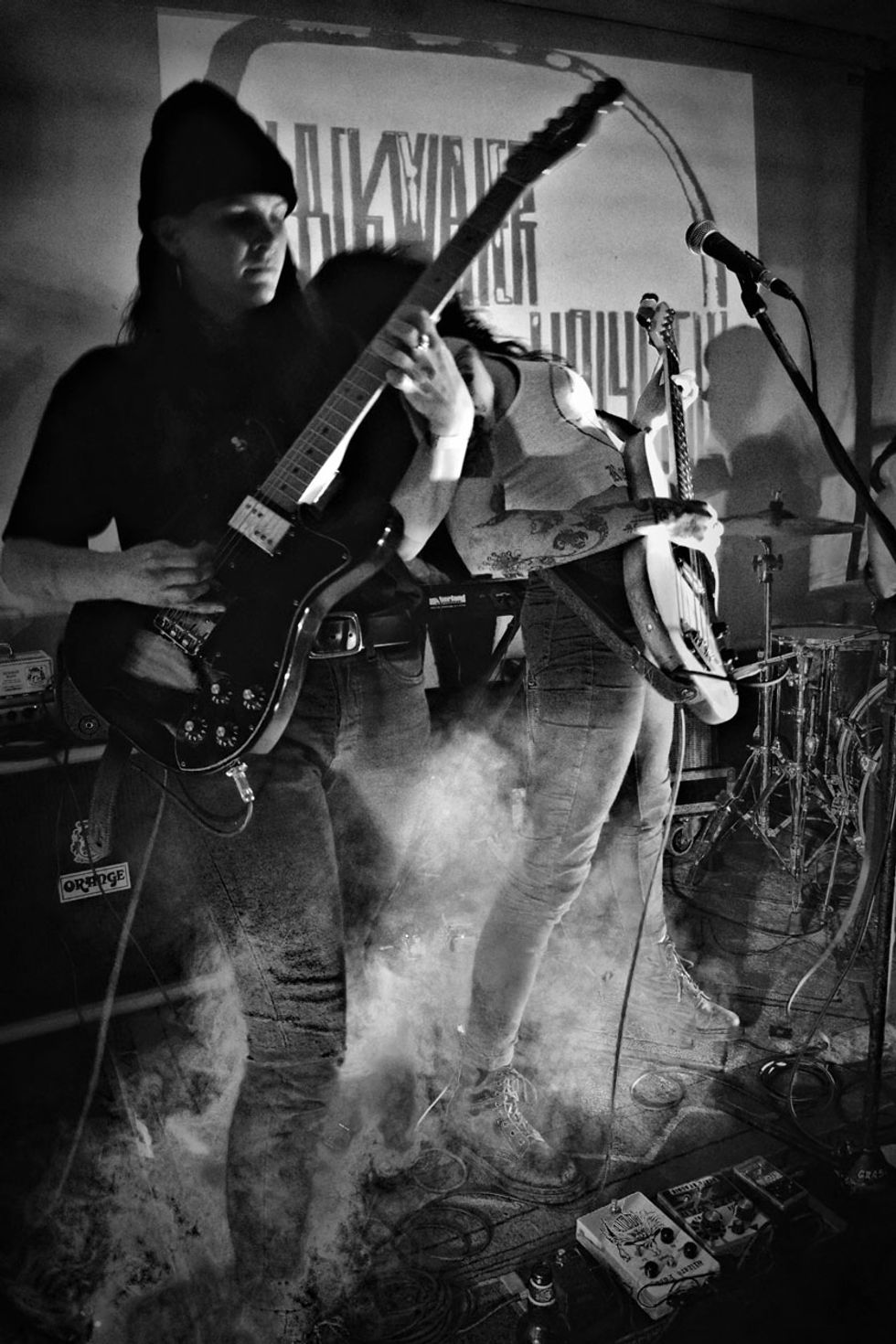







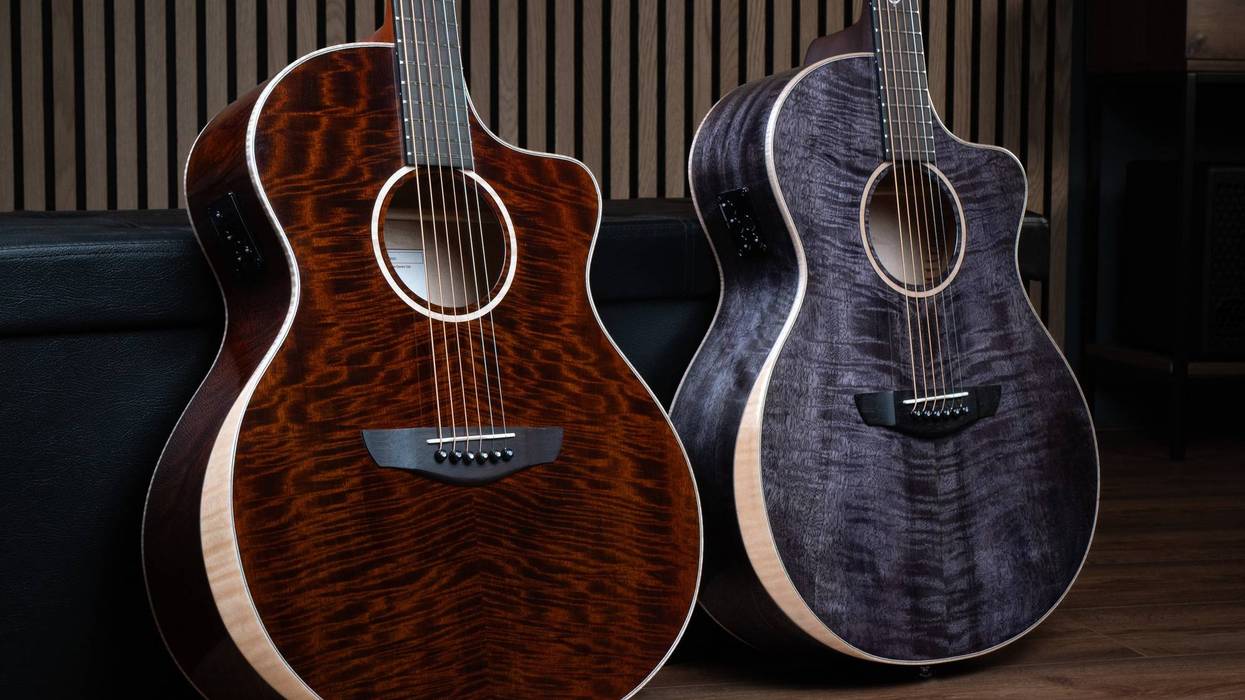
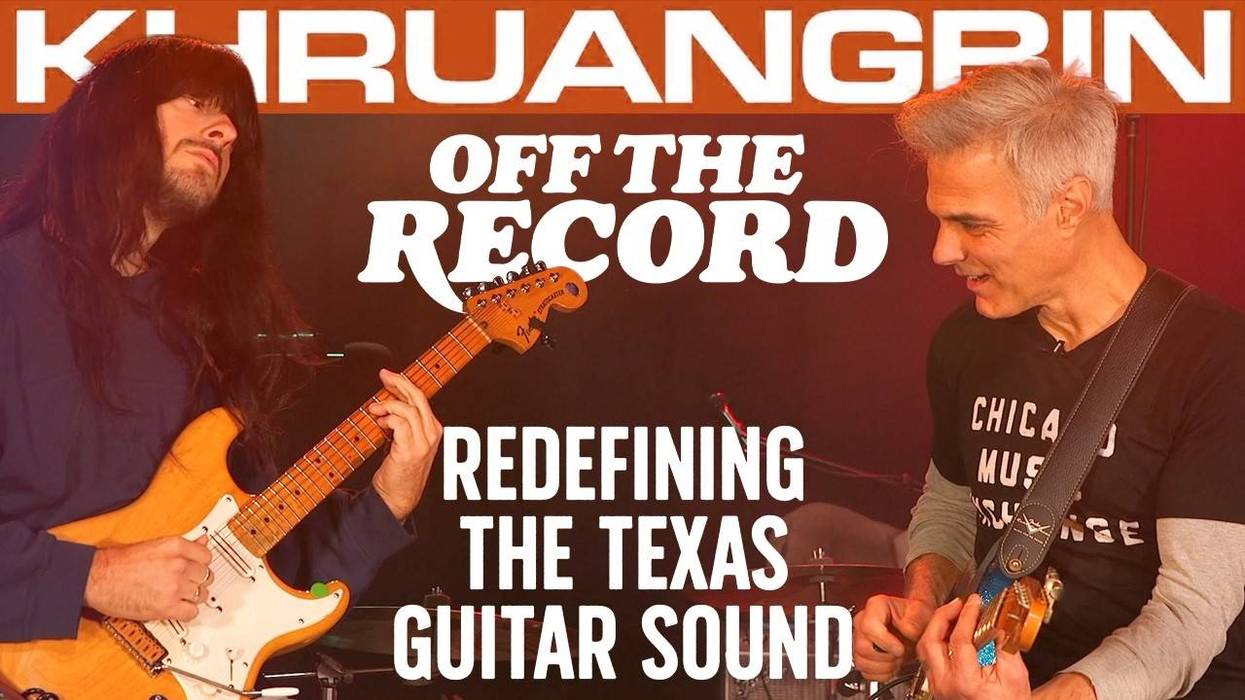
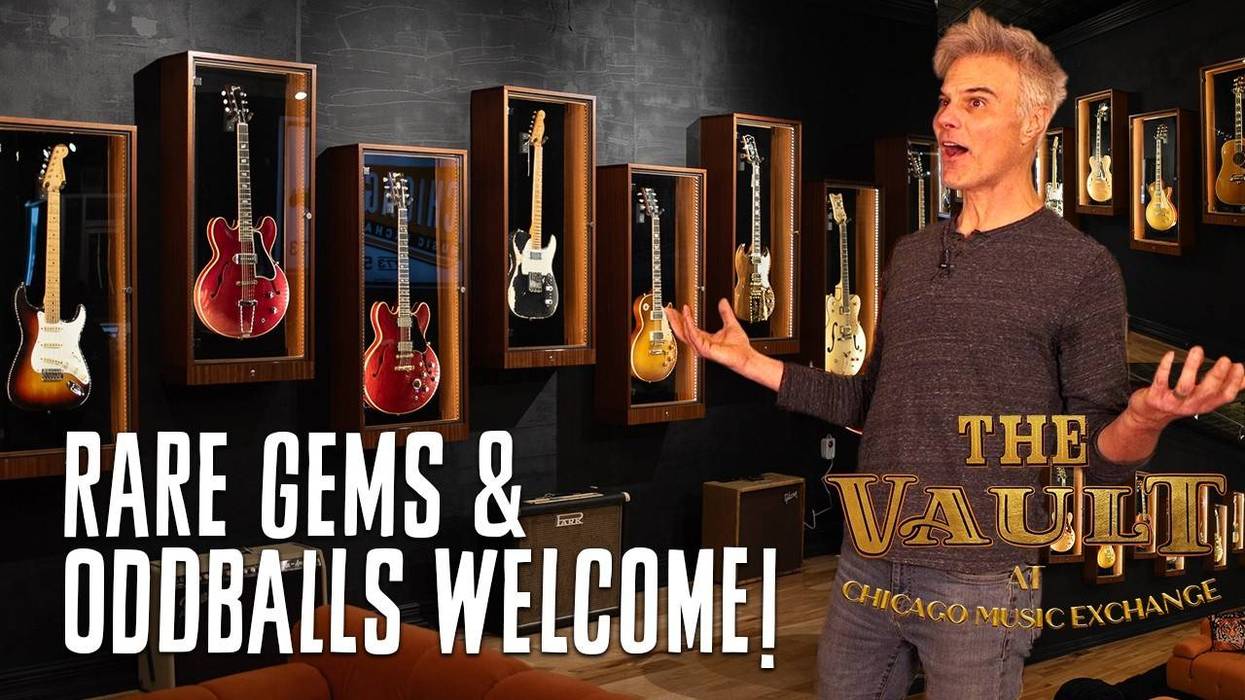
![Rig Rundown: Russian Circles’ Mike Sullivan [2025]](https://www.premierguitar.com/media-library/youtube.jpg?id=62303631&width=1245&height=700&quality=70&coordinates=0%2C0%2C0%2C0)

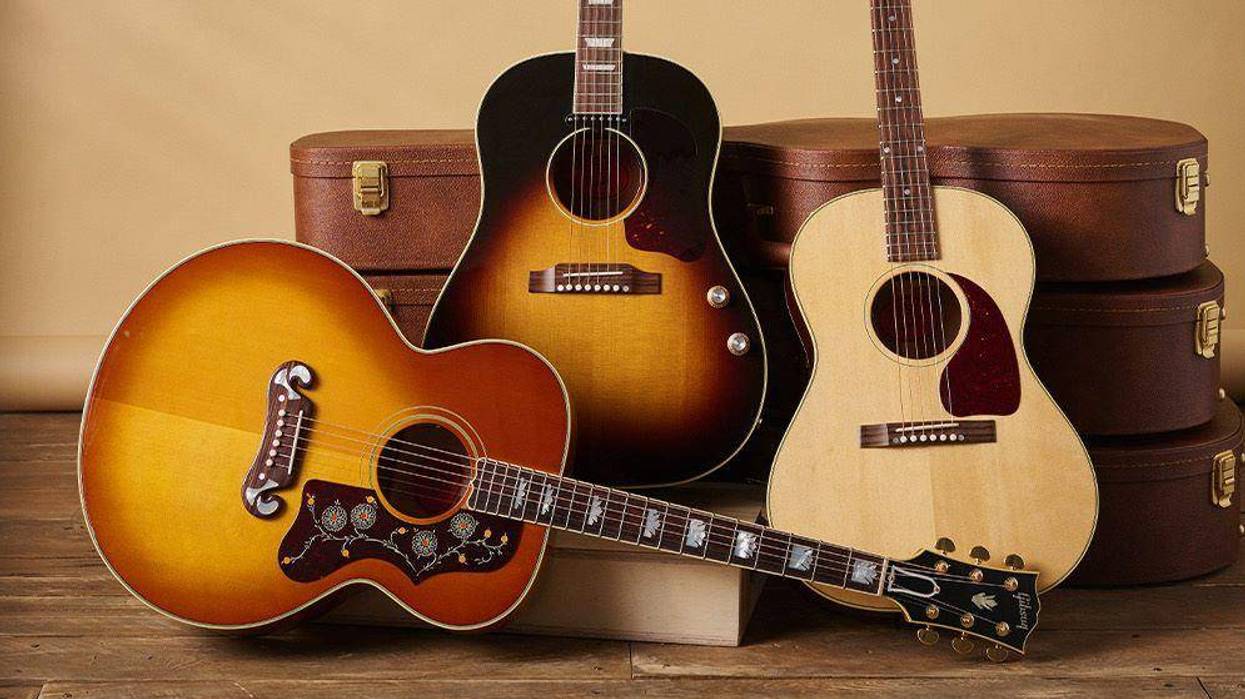











![Rig Rundown: AFI [2025]](https://www.premierguitar.com/media-library/youtube.jpg?id=62064741&width=1245&height=700&quality=70&coordinates=0%2C0%2C0%2C0)




















 Zach loves his Sovtek Mig 60 head, which he plays through a cab he built himself at a pipe-organ shop in Denver. Every glue joint is lined with thin leather for maximum air tightness, and it’s stocked with Celestion G12M Greenback speakers.
Zach loves his Sovtek Mig 60 head, which he plays through a cab he built himself at a pipe-organ shop in Denver. Every glue joint is lined with thin leather for maximum air tightness, and it’s stocked with Celestion G12M Greenback speakers.






